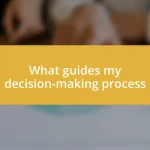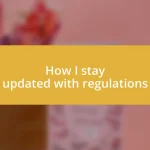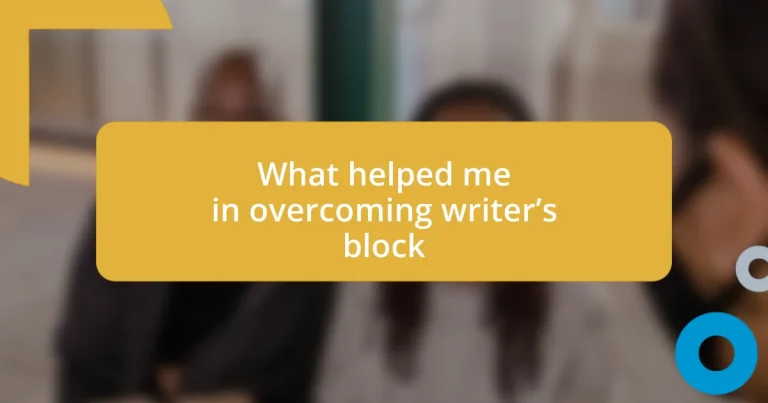Key takeaways:
- Writer’s block often stems from emotional issues like perfectionism and fear of failure, requiring introspection to identify underlying causes.
- Implementing structured writing routines, setting small goals, and practicing free writing can effectively help overcome writer’s block and reignite creativity.
- Engaging with nature, connecting with fellow writers, and revisiting inspiring works can provide motivation and fresh ideas to maintain creativity.
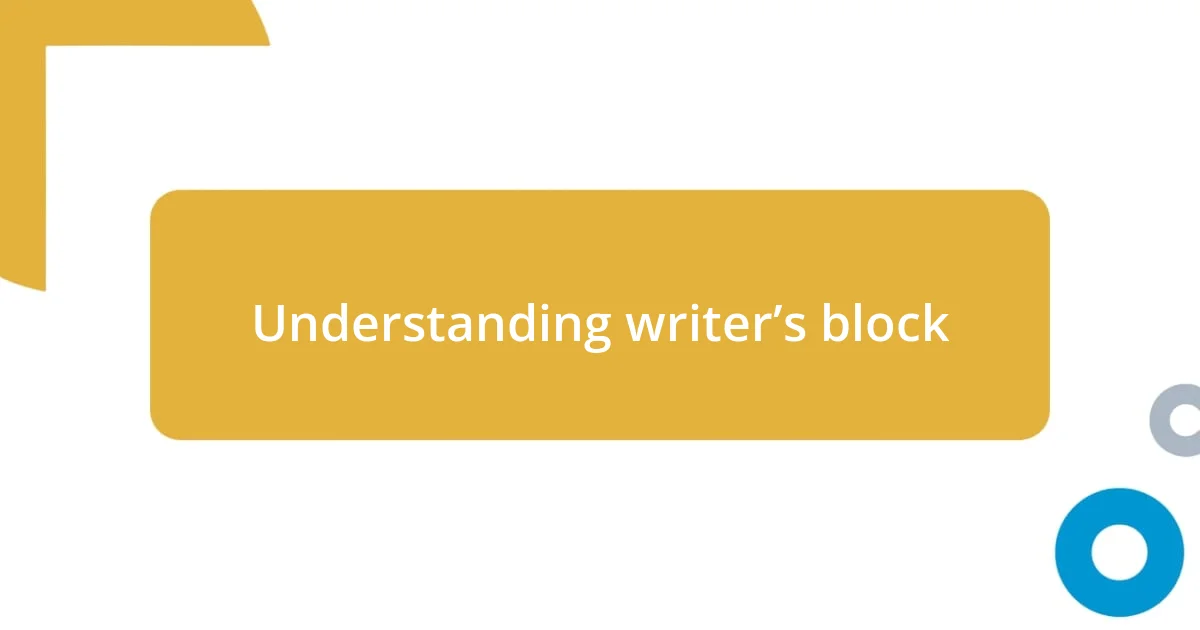
Understanding writer’s block
Writer’s block can feel like an insurmountable wall, can’t it? I remember sitting at my desk, staring blankly at a sheet of paper, the words escaping me completely. It’s a frustrating experience that seemingly paralyzes creativity and leads to self-doubt.
At its core, writer’s block is not just about the inability to produce words; it’s often tied to deeper emotional issues, like fear of failure or perfectionism. I’ve found myself caught in cycles of overthinking, where I’d worry if my next piece would resonate with readers or fall flat. Does that sound familiar to you?
Over time, I’ve come to realize that writer’s block can also signal a need to disengage and recharge. There were days when stepping away from my writing felt counterintuitive, yet those moments spent in nature or doing something entirely different often reignited my inspiration. Maybe you’ve had a similar revelation—sometimes the best ideas come when you’re not actively searching for them.
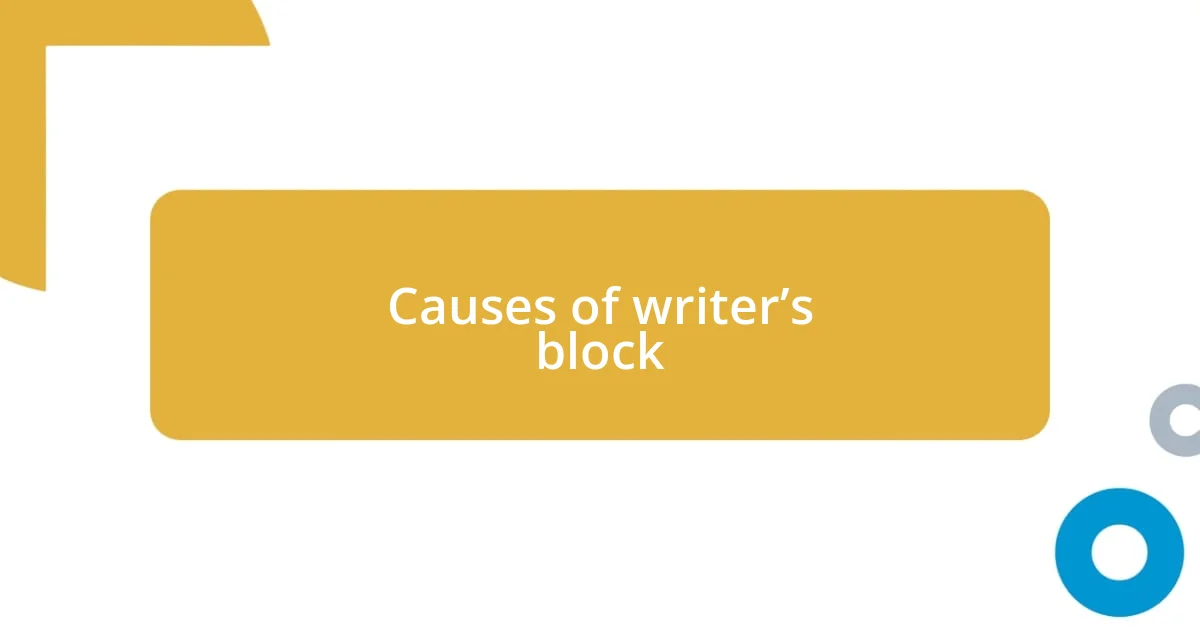
Causes of writer’s block
The causes of writer’s block can be quite varied and often deeply personal. I’ve experienced moments where unexpected life changes, like moving to a new city or going through a tough breakup, have thrown my focus completely off balance. Even small things, like a persistent cold or too many distractions at home, can impact my ability to write.
Here are some of the common causes I’ve identified over time:
- Fear of failure: Worrying that my work won’t meet my own or others’ expectations can create immense pressure.
- Perfectionism: Striving for the ‘perfect’ sentence often leads to paralyzing doubt and second-guessing.
- Lack of inspiration: Sometimes, the ideas just don’t flow, leaving me feeling like I’m grasping at straws.
- Emotional distress: Personal issues or stress can take a toll on creativity, draining my motivation.
- Overwhelm: Juggling multiple projects can make it challenging to focus on one writing task at a time.
In my journey, I’ve learned that recognizing these causes is the first step to combating them. Understanding why I might be struggling often provides clarity and a pathway to overcome that block.
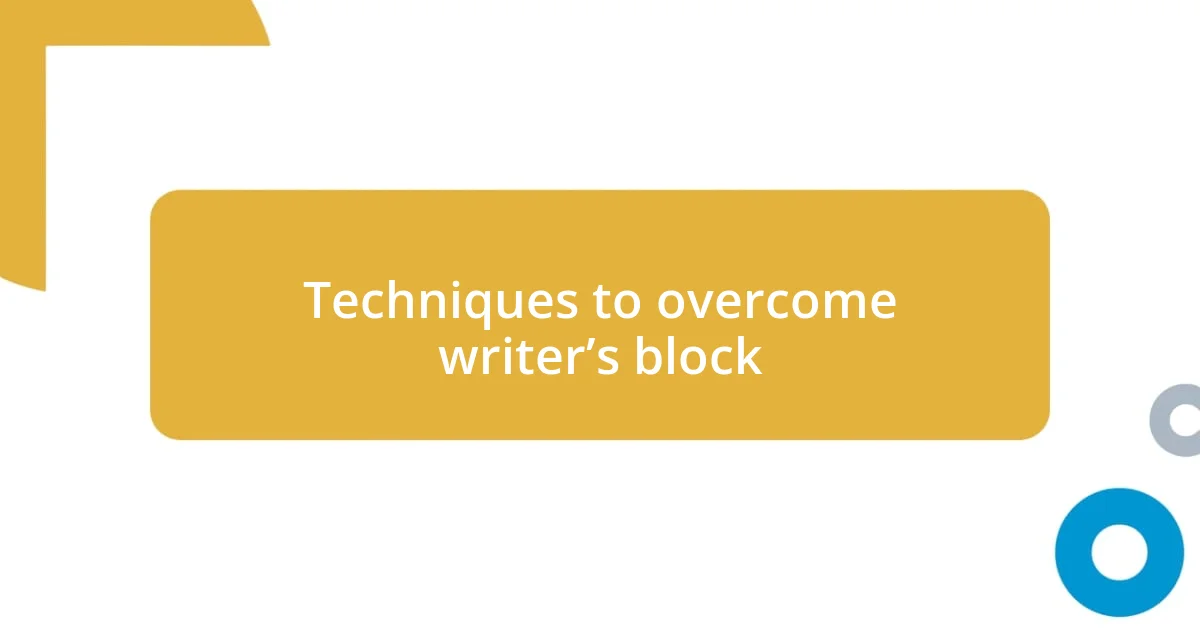
Techniques to overcome writer’s block
When tackling writer’s block, I’ve found that creating a structured writing routine can make all the difference. For instance, I developed a habit of writing at the same time each day, which trained my mind to be ready for creativity. This consistency has helped me ease into my writing process and, surprisingly, the words started to flow more freely.
Another technique that has been beneficial for me is setting small, achievable goals. Instead of aiming to write an entire chapter, I focus on completing a single paragraph or even just a few sentences. This approach reduces the pressure and allows me to celebrate small wins—like when I finally found the right words for that introductory sentence I’d been struggling with. It’s amazing how those little victories can build momentum.
Lastly, I often resort to free writing as a way to break through the mental barriers. I’ve practiced this by writing whatever comes to mind for a set period, with no concern for grammar or coherence. Just recently, I did this for ten minutes and ended up discovering a new character idea that sparked my excitement! Free writing has a wonderful way of unlocking creativity because, in the chaos of unfiltered thoughts, I sometimes stumble upon gems that pave the way for my next big project.
| Technique | Description |
|---|---|
| Structured Writing Routine | Writing at a set time daily to build habit and readiness. |
| Small Achievable Goals | Focusing on completing brief tasks to reduce pressure. |
| Free Writing | Unrestricted writing for a set time to spark creativity. |
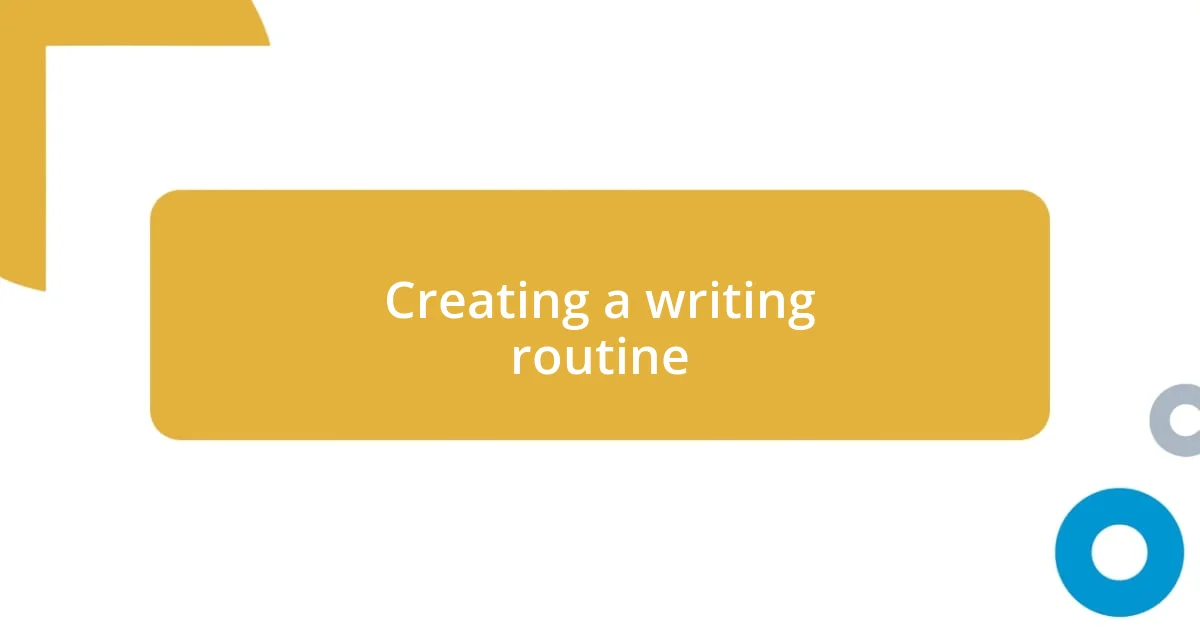
Creating a writing routine
Establishing a writing routine transformed my writing life. I remember the first day I committed to writing every morning at 7 AM. At first, I struggled to get words on the page, but this consistency helped me cultivate a space where ideas could flourish. There’s something magical about knowing when it’s time to write—my mind learned to switch gears, allowing creativity to bubble up at that designated hour.
One thing I’ve noticed is that setting a specific duration can make a big difference. When I first tried writing for an hour, I found I’d often get lost in my thoughts, losing track of time altogether. Now, I use a timer to keep myself accountable, and this simple act has turned into a mini challenge. Have you ever noticed how a ticking clock can turn pressure into motivation? I find that when time is on my side, I often produce my best ideas, fueled by the thrill of racing against the clock!
Finally, I’ve made it a point to evaluate my routine regularly. I once felt stagnant after weeks of sticking to the same schedule, so I decided to shake things up by changing my writing location. Moving to a cozy café breathed new life into my routine. It taught me that flexibility within a routine is necessary; this balance helps to stave off monotony while still giving me a reliable framework to harness my creativity. Isn’t it fascinating how a simple change of scenery can spark new ideas? I’ve found my imagination often thrives on variety, reminding me why establishing a routine doesn’t mean staying stagnant.
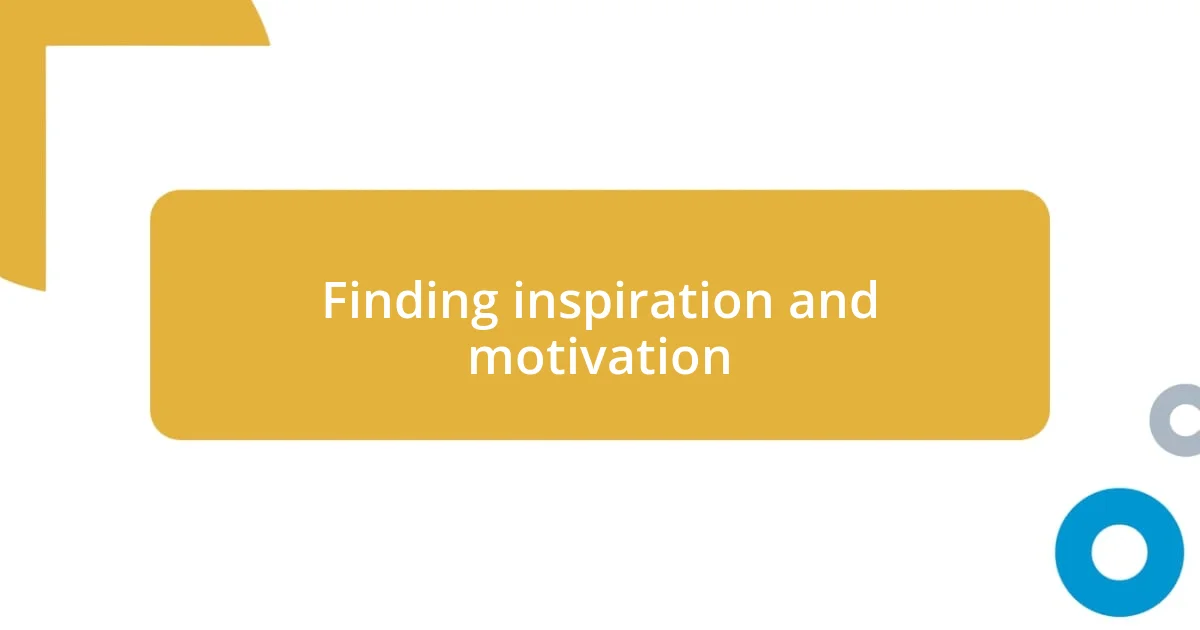
Finding inspiration and motivation
When searching for inspiration, I often turn to nature. One sunny afternoon, while hiking up a local trail, I stumbled upon a vibrant patch of wildflowers. The colors and delicate architecture of each petal ignited a spark in me, reminding me that beauty can be found everywhere. Have you ever noticed how a simple change in your surroundings can transform your mindset? For me, this outdoor moment turned into a metaphor for creativity—sometimes, stepping away is all it takes to reignite your passion.
Another source of motivation has been connecting with fellow writers. I remember attending a small workshop where we shared our struggles openly. Hearing someone else articulate the same frustrations I faced was comforting. In those moments, I realize that creativity is a shared journey. Have you experienced that sense of camaraderie? It’s remarkable how these conversations can shift your perspective and fuel your drive, simply by knowing you’re not alone in the creative struggle.
Lastly, I’ve found that revisiting my favorite books or movies can be incredibly inspiring. Recently, I reread a novel that profoundly impacted me during my teenage years. As I flipped through the pages, I felt a mix of nostalgia and eagerness to create something that could evoke similar emotions. This reminder of the power of storytelling reignited my own passion for writing. Have you ever had that moment where nostalgia drives you back to your creative core? I believe that exploring what once inspired us can be a powerful tool for overcoming blocks in our writing journey.
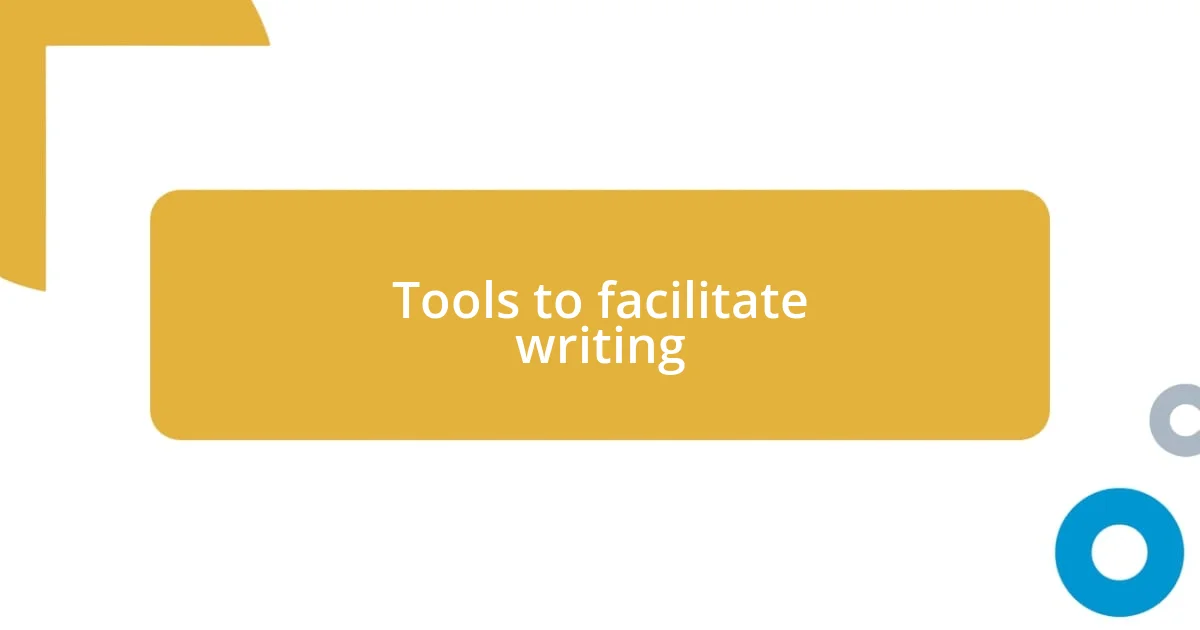
Tools to facilitate writing
When it comes to tools that have helped me break through writer’s block, I’ve discovered the power of writing software. I remember the first time I tried using Scrivener—it was like a game-changer for my writing process. Its organizational features allowed me to arrange my ideas and notes in one place, making daunting tasks feel manageable. Have you ever felt overwhelmed by a blank page? Having everything at my fingertips eased my anxiety and opened up a world of creativity.
Another tool I swear by is a simple word count tracker. For me, seeing my progress visually is incredibly motivating. I recall a week when I aimed for a specific word count each day. Watching the numbers climb inspired me to push past my usual limits, and by the end of the week, I had completed a short story I never thought I’d write. This made me wonder—how often do we underestimate our capabilities? Embracing this kind of tracking not only kept me accountable but also highlighted the joy of achieving mini-goals.
Additionally, I’ve found immense value in distraction-blocking apps. I recall an afternoon when I planned to write, only to get sidetracked by notifications and social media. After that, I decided to try an app that would temporarily block distractions, and it worked wonders! It created a focused atmosphere where I could dive deep into my writing without interruptions. Aren’t there times when you just wish the world would pause? This tool taught me the importance of carving out undisturbed time for creativity, allowing my thoughts to flow freely.
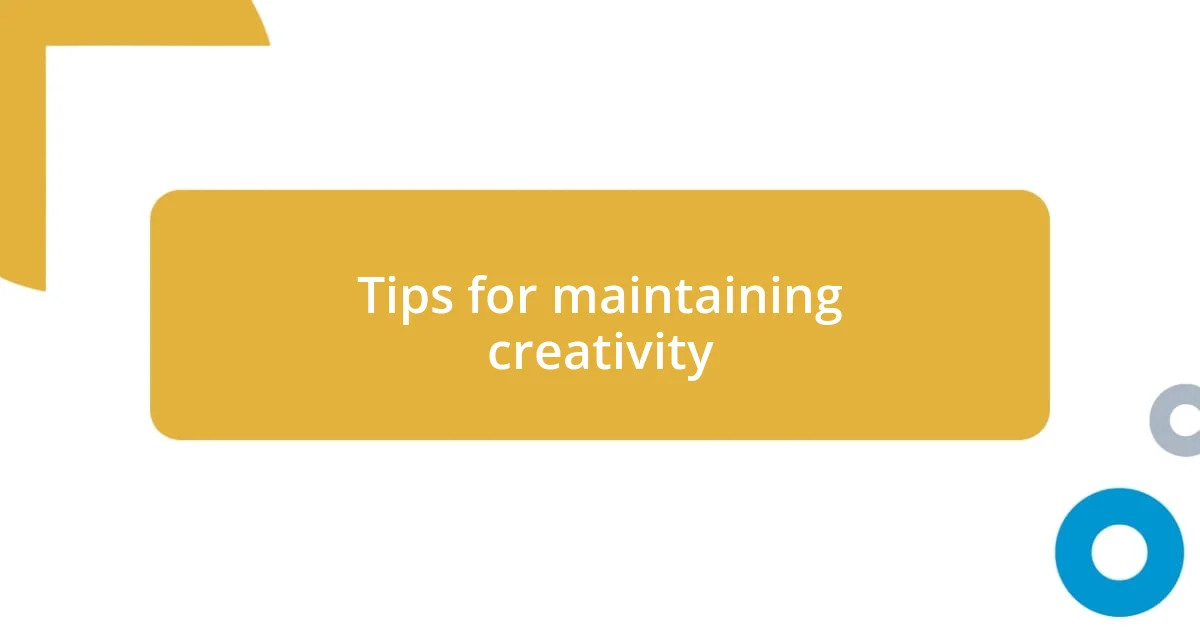
Tips for maintaining creativity
Maintaining creativity can sometimes feel like holding onto a slippery fish. One of my go-to methods is setting a specific time for creative practices. I remember the first time I dedicated a whole hour just for brainstorming. The structured time made me feel like I was giving myself permission to explore wild ideas without judgment. Have you ever tried blocking off a time just for your creativity? It’s remarkable how the commitment can spark unexpected thoughts.
Another tactic that really resonates with me is surrounding myself with different art forms. One evening, after being stuck in a writing rut, I decided to visit an art gallery. The vibrant paintings and sculptures ignited a flurry of inspiration. I came home with a notepad filled with new story ideas influenced by the colors and emotions I’d witnessed. Have you ever noticed how different media can unlock new paths in your mind? Engaging with other forms of creativity can breathe life into your writing.
Lastly, keeping a “creativity journal” has been a game-changer. I jot down quotes, doodles, or even random thoughts whenever inspiration strikes. One day, while browsing through past entries, I stumbled across a whimsical doodle that reminded me of a dream I once had. That simple sketch became the foundation for a short story that resonated deeply with both myself and my readers. Do you have a place where you collect your creative sparks? I believe that intentionally capturing these moments can transform fleeting thoughts into powerful narratives.


